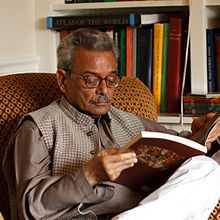Shamsur Rahman Faruqi
| Shamsur Rahman Faruqi شمس الرحمٰن فاروقی | |
|---|---|
 | |
| Born |
Shamsur Rahman Faruqi January 15, 1935 India |
| Nationality | Indian |
| Occupation | poet, critic |
Shamsur Rahman Faruqi (Urdu: شمس الرحمٰن فاروقی) (born January 15, 1935) is an Indian poet and one of the leading Urdu critics and theorists. He is regarded as the T.S. Eliot of Urdu criticism and has formulated fresh models of literary appreciation.[1] He absorbed western principles of literary criticism and subsequently applied them to Urdu literature, but only after adapting them to address literary aesthetics native to Arabic, Persian, and Urdu [2]
Early life
He was born on 15 January 1935 in India. He received his Master of Arts (MA) degree in English from Allahabad University in 1955.[1]
Career
He began writing in 1960. Initially he worked for the Indian postal service (1960-1968), and then as a chief postmaster-general and member of the Postal Services Board, New Delhi until 1994. He was also editor of his literary magazine Shabkhoon and part-time professor at the South Asia Regional Studies Center at the University of Pennsylvania.[1]
An expert in classical prosody and ‘ilm-e bayan (the science of poetic discourse), he has contributed to modern literary discourse with a profundity rarely seen in contemporary Urdu critics.[1]
He is the recipient of numerous honors and awards. Most recently he was awarded the prestigious Saraswati Samman for his work She`r-e Shor-Angez, a four-volume study of the eighteenth-century poet Mir Taqi Mir.[1]
Dastangoi
Dastangoi is a 16th-century Urdu oral storytelling art form.[3] The art form was revived in 2005[4] and has been performed in India, Pakistan, and the United States.[5] The art form reached its zenith in the Indian sub-continent in the 19th century and is said to have died with the demise of Mir Baqar Ali in 1928.[4] Shamsur Rahman Faruqi and his nephew, writer and director Mahmood Farooqui have played significant roles in its revival in the 21st century.[6]
Awards
He was awarded the Saraswati Samman, a prestigious literary award in India in 1996.[1]
Bibliography
- Sher, Ghair Sher, Aur Nasr, (1973)[1]
- The Secret Mirror, (in English, 1981)[1]
- Ghalib Afsaney Ki Himayat Mein, (1989)[1]
- Sher Shore Angez (in 3 volumes, 1991–93)[1]
- Mir Taqi Mir 1722-1810 (Collected works with commentary and explanation)[1]
- Urdu Ka Ibtedai Zamana (2001)[1]
- Ganj-i-Sokhta (poetry)[1]
- Sawar Aur Doosray Afsanay (fiction)[1]
- Jadeediyat Kal Aur Aaj (2007)
See also
- List of Urdu language poets
- List of Urdu language writers
References
- ↑ 1.0 1.1 1.2 1.3 1.4 1.5 1.6 1.7 1.8 1.9 1.10 1.11 1.12 1.13 "Shamsur Rehman Faruqi - The master critic". Columbia.Edu (source=Daily Dawn-11 July 2004). Retrieved 2012-08-25.
- ↑ "A Conversation with Shamsur Rahman Faruqi by Prem Kumar Nazar". UrduStudies.com. Retrieved 2012-09-13.
- ↑ "Walk Back In Time: Experience life in Nizamuddin Basti, the traditional way". The Indian Express. 29 November 2012. Retrieved 18 December 2012.
- ↑ 4.0 4.1 Ahmed, Shoaib (6 December 2012). "Indian storytellers bring Dastangoi to Alhamra". Dawn. Retrieved 18 December 2012.
- ↑ Sayeed, Vikram Ahmed (14 January 2011). "Return of dastangoi". Frontline. Retrieved 18 December 2012.
- ↑ Husain, Intizar (2011-12-25). "COLUMN: Dastan and dastangoi for the modern audience". Dawn (newspaper). Retrieved 2013-11-07.
External links
- Shamsur Rahman Faruqi Website
- Work in English
- "A Conversation with Literary Critic and Novelist Shamsur Rahman Faruqi", New York Times
| |||||||||||
|